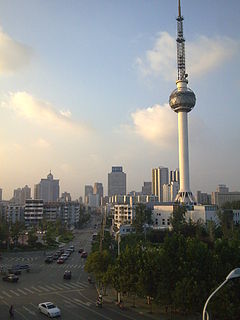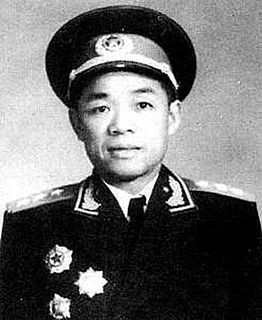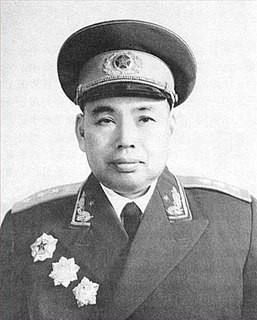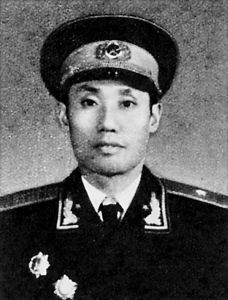
Xuzhou (徐州), also known as Pengcheng (彭城) in ancient times, is a major city in northwestern Jiangsu province, China. The city, with a recorded population of 9,083,790 at the 2020 census, is a national complex transport hub and an important gateway city in East China. Xuzhou is a central city of Huaihai Economic Zone and Xuzhou metropolitan area. Xuzhou is an important node city of the country's Belt and Road Initiative, and an international new energy base. Xuzhou has won titles such as the National City of Civility (全国文明城市) and the United Nations Habitat Scroll of Honour award.

Su Yu, Courtesy name Yu (裕) was a Chinese military commander, general of the People's Liberation Army. He was considered by Mao Zedong to be among the best commanders of the PLA, only next to Peng Dehuai, Lin Biao and Liu Bocheng. Su Yu fought in the Second Sino-Japanese War and in the Chinese Civil War. He commanded the East China Field Army during the Chinese Civil War. One of his most notable accomplishments was the capture of Shanghai.

Chen Bingde is a retired general in the People's Liberation Army (PLA). He was the Director-General of the General Armaments Department until September 2007. In this position he acted as the head of the space program of China. He then served as chief of the PLA General Staff Department. He retired in 2012, and was succeeded by General Fang Fenghui as chief of General Staff.

Han Xianchu was a general of the Chinese Communist Party. Han participated in many military campaigns and battles such as Battle of Pingxingguan, Liaoshen Campaign, Pingjin Campaign, Hainan Campaign, and the Korean War. In 1955 he was among the first group of military leaders to be awarded the Shang Jiang rank.

Li Kenong was a Chinese general and politician, one of the creators of the security and intelligence apparatus of both the Communist Party of China and the People's Liberation Army. Notably, he served as Director of the Central Investigation Department, Deputy Chief of the PLA General Staff Department and Deputy Minister of Foreign Affairs and was awarded the rank of General in 1955.

Li Desheng was a general in the Chinese People's Liberation Army. He was born in Xin County, Henan, China, an area now known as the "Cradle of Generals" for the large number of senior military officers born in the region. He joined the Chinese Workers' and Peasants' Red Army at the age of 14, in 1930, the Communist Youth League in 1931, and the Communist Party of China a year later. He attained the rank of Major General in 1955, and General in 1988. The patterns of Li's advancement suggest that he was mentored by Chen Xilian, and that he was closely aligned with You Taizhong. Li Desheng served on the politburo from 1969–1985, one of the most turbulent periods of the People's Republic. He died in Beijing on 8 May 2011.

The 17th Central Committee of the Chinese Communist Party was elected by the 17th Congress on 21 October 2007, and sat until the 18th National Congress in 2012. The 17th CC is composed of full members and alternate members. It was followed by the 18th Central Committee of the Chinese Communist Party. A member has voting rights, while an alternate does not. If a full member is removed from the CC the vacancy is then filled by an alternate member at the next committee plenum — the alternate member who received the most confirmation votes in favour is highest on the order of precedence. To be elected to the Central Committee, a candidate must be a party member for at least five years.

Li Na, is the daughter of Mao Zedong and his fourth wife Jiang Qing, and their only child together. Her surname is Li rather than Mao, because her father used the pseudonym "Li Desheng" for a period of time during the Chinese Civil War.

Xu Shiyou was a general in the Chinese People's Liberation Army.
Peng Chong, born Xu Tieru (許鐵如), was a member of the Chinese Communist Party (CCP) Central Committee (1969–87) and its politburo (1977–82); and Secretary General of the National People’s Congress between 1988 and 1992.
Qiang Wei is a Chinese politician and senior regional official. He is serving as Vice-Chairperson of National People's Congress Internal and Judicial Affairs Committee. Previously, he served as the Communist Party Secretary of Jiangxi province between 2013 and 2016. He spent much of his earlier political career in Beijing as a key leader of its law-enforcement institutions, including the Beijing Political and Legislative Affairs Commission (Zhengfawei) and the Beijing Public Security Bureau. He also served as the party chief of Qinghai province.

Ke Qingshi was a senior leader of the People's Republic of China and Communist Party of China in 1950s and 1960s.

Zhang Yunyi, was a Communist revolutionary and military strategist of the People’s Republic of China. Born in Wenchang, Hainan, he joined the Communist Party of China in 1926, and took part in the Northern Expedition, the Nanchang Uprising, the Baise Uprising, the Second Sino-Japanese War and the Chinese Civil War. Zhang held the posts of the army commander of the 7th Red Army, the assistant staff officer of the Military Commission of the Central Committee of the CPC, the commander of a military area, etc., and was named one of the ten Senior Generals in 1955. The Zhang Yunyi Memorial Hall is located in Wenchang, Hainan Province.
The following lists events that happened during 2015 in China.
Du Runsheng was a Chinese military officer, revolutionary leader, politician, and economist. He has been hailed as "China's father of rural reform". From 1982 to 1986, he drew up the annual "Document No.1 of the Central Government" about rural reform, which promoted the development of rural areas. Du's students included Wang Qishan, Justin Yifu Lin, Zhou Qiren, Wen Tiejun, Wang Xiaoqiang, Chen Xiwen, Zhang Musheng, Du Ying and Weng Yongxi.

The Eastern Theater Command is one of the five theater commands of the People's Liberation Army, founded on 1 February 2016. Its predecessor was the Nanjing Military Region. The headquarters is located in Nanjing.
Zhu Shengling is a general of the Chinese People's Liberation Army. He has served as Political Commissar of the Central Theater Command since 2019. He previously served as Political Commissar of the People's Armed Police from 2017 to 2019.
Fan Xiaojun is a general of the Chinese People's Liberation Army Air Force (PLAAF). He had been Political Commissar of the Northern Theater Command since April 2017, and formerly served as Director of the Political Department of the PLAAF.

Li Yaowen, born Zhang Xishen (张锡绅), was an admiral in the Chinese People's Liberation Army.

Li Qiang was a Chinese Communist revolutionary, military engineer, secret agent, and politician. He served as Minister of Foreign Trade from November 1973 to September 1981 and was an academician of the Chinese Academy of Sciences.














